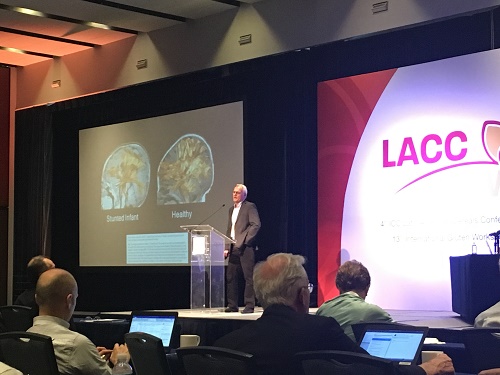
People who eat the most whole grain foods have a lower risk of almost all chronic diseases and are less likely to gain weight as they age, according to Julie Miller Jones, Distinguished Scholar and Professor Emerita at St. Catherine University, U.S.A.
“All kinds of epidemiological research shows that whole grain intake reduces obesity and the risk of diabetes, coronary heart and cardiovascular diseases, stroke, cancers, and death from all causes,” said Miller Jones, speaking to representatives of food processing companies and associations and scientists at the first “Maize and Wheat Quality and Nutrition Day” held near Mexico City on September 14.
Miller Jones emphasized that relatively modest amounts of grain in diets can deliver important health impacts. “We’re talking about eating around three slices of bread, or a bowl of oatmeal with a sandwich, or oatmeal in the morning, with pasta at lunch and rice at night,” she explained.
Hosted by the International Maize and Wheat Improvement Center (CIMMYT), a publicly-funded organization that works with hundreds of partners throughout the developing world to increase the productivity and quality of maize and wheat cropping systems, the event highlighted the critical connections between farmers, crop breeding and the quality of maize (corn) and wheat food products.
“It’s great that CIMMYT hosted this meeting,” said one participant, noting the complementary roles of the food industry and CIMMYT. “Companies like ours are only beginning to realize that improving our bottom line and sustainability doesn’t start with the flour we receive, but rather ten steps before that, with breeding, quality analyses, agronomy and even extension work in the field.”

The participants were impressed with Miller Jones’ presentation and the potential for partnering with CIMMYT, which conducts grain quality and nutritional analyses, development, selection and characterization of wheat and maize varieties for industrial and nutritional quality, as well as fostering the responsible sourcing of grain and linking farmers with markets.
“This is the first time we’ve brought together numerous essential actors in Mexico’s maize and wheat quality and nutrition value chains, and we expect that it will give dividends in better quality, more nutritious cereal grains and food for better diets,” said Natalia Palacios, CIMMYT maize nutrition and quality specialist.
In addition to using more than 35 million tons of maize each year as human food and animal feed, Mexico’s food processors annually handle more than 8 million tons of wheat grain.
“CIMMYT can serve as a shared platform for joint research with the food industry, outside of the competitive arena, and for messaging on healthy nutrition and diets,” suggested Carlos Guzmán, head of CIMMYT’s wheat chemistry and quality lab.
Together with the International Association for Cereal Science and Technology (ICC), Guzmán is organizing the 4th ICC Latin American Cereals Conference and the 13th International Gluten Workshop, both to be held in Mexico City from 11 to 17 March 2018.
Humans and food grain crops: Shared history and future
Miller Jones said that DNA of cooked grain has been found in the dental remains of Paleolithic humans, showing that people have been eating grain for more than 100,000 years. She also emphasized the need for balanced diets that feature all food groups in healthy amounts.
“We need to change our diets to healthy patterns that we can maintain for our entire lifetime, not something that you go on to go off,” she said, speaking recently in an online interview hosted by CIMMYT. “Just as nutrition experts have always recommended, unless you’re allergic to a particular food, a healthy diet should include products from all food groups, in the right amounts.”

 Nutrition, health and food security
Nutrition, health and food security 


